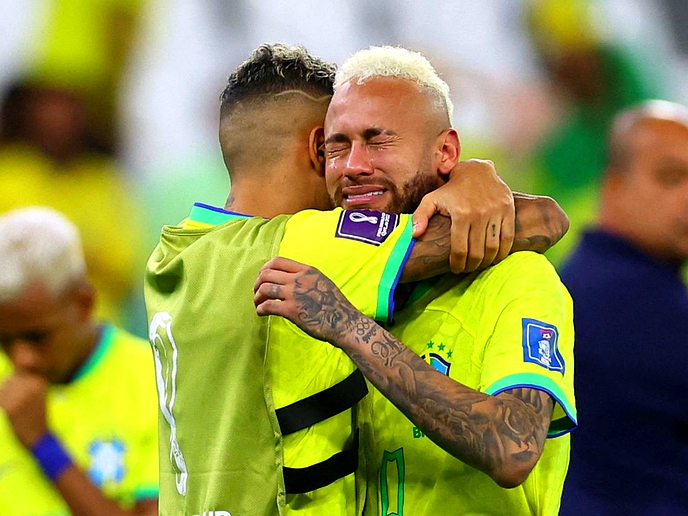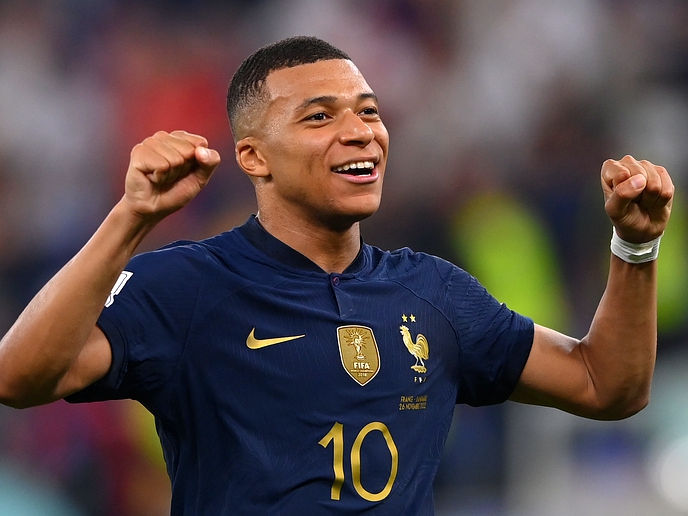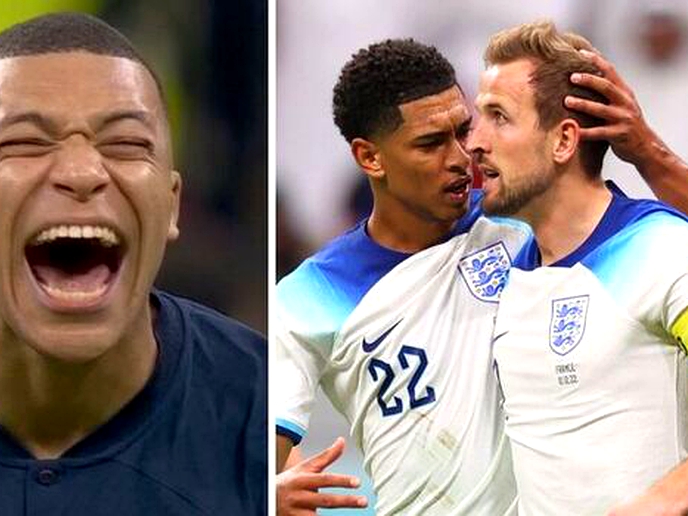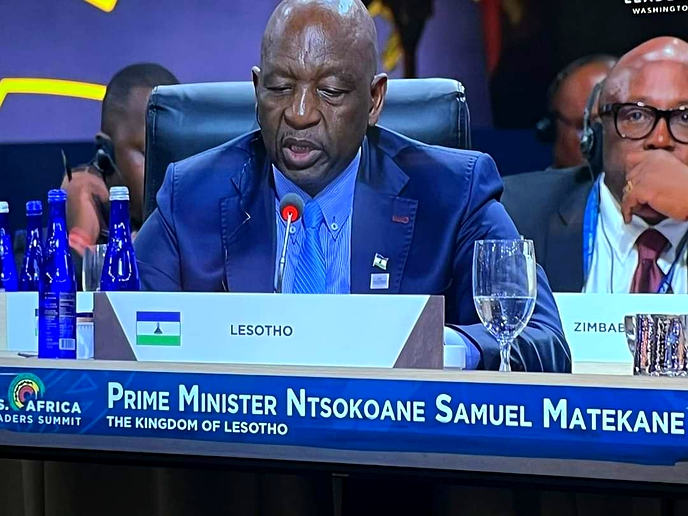Argentina have won the 2022 FIFA World Cup after winning on penalties following a 3-3 draw against France in the final. Lionel Messi scored twice to help his nation be crowned world champions.
sports
Dec. 18, 2022
BY SAM HILL, FOOTBALL LONDON
7 min read
Argentina win World Cup after beating France in penalty shootout
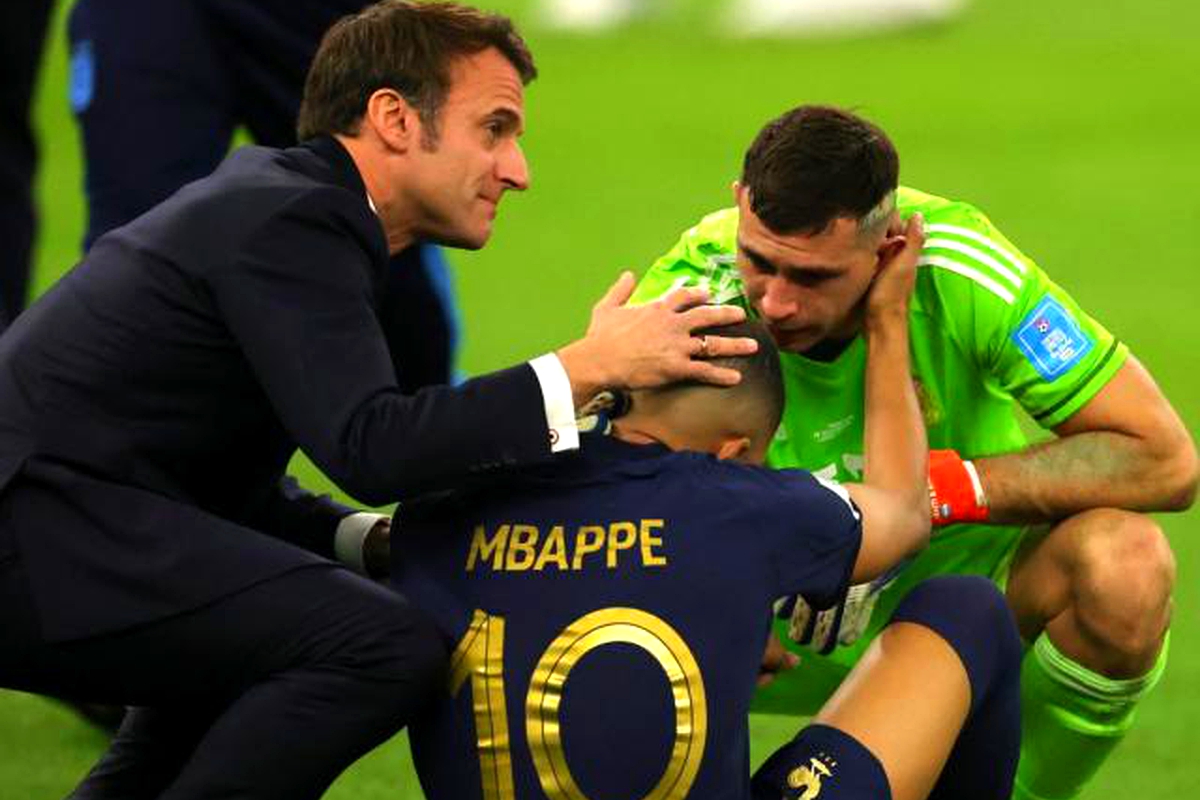
France president Emmanuel Macron consoles Kylian Mbappe and France players after World Cup final loss to Argentina (Photo: Alex Pattle, Yahoo)
Story highlights
Angel Di Maria won a penalty after Ousmane Dembele fouled the winger in the penalty box, which Messi comfortably converted past Hugo Lloris. Di Maria then added a second after slotting the ball home from close range following a brilliant passing move from Argentina which cut Les Bleus apart.
Kylian Mbappe restored hope for France with two quick-fire goals late in the match, taking the game to extra-time before Messi popped up with a third goal for Argentina in the 109th minute after a lengthy VAR check deemed that the goal was able to stand. Mbappe sealed his hat-trick from the penalty spot in the 118th minute.
Lionel Messi scored from the spot in the shootout as France missed two penalties and saw Argentina take their crown as world champions. Emiliano Martinez was the hero once again as he pulled off a brilliant save to deny Kingsley Coman before seeing Aurelien Tchouameni put his spot kick wide of the post moments later.
Gonzalo Montiel scored the winning penalty after sending Lloris the wrong way and immediately broke down in tears. Messi has followed in the footsteps of iconic Argentina star Diego Maradona in lifting the World Cup with his nation.
End
Lionel Messi’s once-in-a-generation career is complete. The Argentina superstar is finally a World Cup champion, according to the AP report.
AP reports: Messi scored two goals and then another in a shootout as Argentina beat France 4-2 on penalties Sunday to claim a third World Cup title despite Kylian Mbappé scoring the first hat trick in a final in 56 years.
Now there’s no debate. Messi is definitively in the pantheon of soccer’s greatest ever players, alongside Pelé - a record three-time World Cup champion from Brazil - and Diego Maradona, the late Argentina great with whom Messi was so often compared.
Messi achieved what Maradona did in 1986 and dominated a World Cup for Argentina. The torch will one day pass to Mbappé, whose late goals lit up one of the most dramatic finals in the tournament’s 92-year history and made him the first scorer of a hat trick in a final since 1966, but not just yet.
“Let’s go, Argentina!” Messi roared into a microphone on the field in the post-match celebrations.
Messi put Argentina ahead from the penalty spot and played a part in Angel Di Maria’s goal that made it 2-0 after 36 minutes.
Mbappé scored two goals in a 97-second span to take the game to extra time, and then Messi tapped in his second goal in the 109th minute. But there was still time for another penalty from Mbappé to take the thrilling game to a shootout.
Gonzalo Montiel scored the clinching penalty kick after Kingsley Coman had an attempt saved by Argentina goalkeeper Emi Martinez and Aurelien Tchouameni missed for France.
Europe’s run of four straight World Cup winners came to an end. The last South American champion was Brazil, and that was also in Asia - when Japan and South Korea hosted the tournament in 2002.
Argentina won its previous World Cup titles in 1978 and 1986. In Qatar, the country backed up its victory from last year’s Copa America, its first major trophy since 1993. It’s quite the climax to Messi’s international career, which might not yet be over at the age of 35 because he is playing as well as ever.
It was quite the finale, too, for a unique World Cup - the first to be played in the Middle East and the Arab world.
For FIFA and the Qatari organizers, a final between two major soccer nations and the world’s two best players represented a perfect way to cap a tournament laced in controversy ever since the scandal-shrouded vote in 2010 to give the event to a tiny Arab emirate.
The years-long scrutiny since has focused on the switch of dates from the traditional June-July period to November-December, strong criticism of how migrant workers have been treated, and then unease about taking soccer’s biggest event to a nation where homosexual acts are illegal.
On Sunday, there was one narrative at play for most people: Could Messi do it?
He could, despite the 23-year-old Mbappé - Messi’s teammate at Paris Saint-Germain - doing all he could to emulate Pelé by winning his first two World Cups.
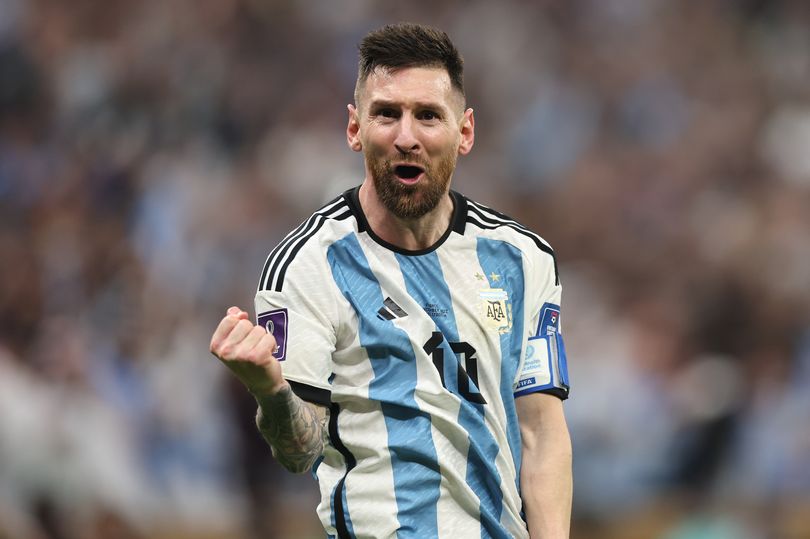
Lionel Messi of Argentina celebrates after scoring a goal to make it 3-2 during the FIFA World Cup Qatar 2022 Final match between Argentina and France. (Photo by Matthew Ashton - AMA/Getty Images)
Enjoy our daily newsletter from today
Access exclusive newsletters, along with previews of new media releases.
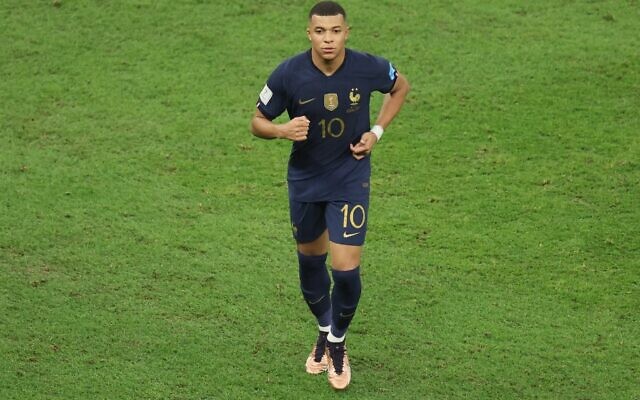
France’s forward Kylian Mbappe reacts during the Qatar 2022 World Cup final football match between Argentina and France. (JACK GUEZ / AFP)
According to the EuroSport, win or lose, Argentina star Lionel Messi has settled the GOAT debate forever.
Ahead of the 2022 World Cup final, Pete Sharland looks at the GOAT debate and why, whether Argentina won or lost, Lionel Messi has more than settled it in his favour. Rightly or wrongly the debate is closed (of course you know that can never be true) and at 35 Messi still has time to add to his legacy. His performances in Qatar have been a remarkable swansong on the world’s biggest stage.
Whether he had won or lost, the internet will be awash with one side of the tedious GOAT debate chirping and crowing, and the other frantically defending their warrior.
For some time now the debate between the greatest (men's) player to ever play has been centred around four players: Pele, Maradona, Messi and Cristiano Ronaldo. Pele had goals and World Cups. Maradona had outrageous genius and one World Cup. Both Messi and Ronaldo have goals at levels that we have never seen before. Purists will lament the failure of the modern generation to include either Ferenc Puskas or Alfredo Di Stefano, but alas this is the way the debate has gone.
Pete Sharland writes:
“There is one primary argument made for each of these four players who have been deemed worthy by the general consciousness. But what side of the debate you come down can depend on multiple factors. Some of this comes down to your personality and personal aesthetic preferences when it comes to football. Some comes down to age and the era you fell in love with football, and some can come down to the club and/or country you support.
So what are the primary arguments made? For Pele the argument is three World Cups, including being part of the second team to win back-to-back titles. It’s over 1000 professional goals (no matter how dubious that is) and his incredible legacy within the game. For Maradona the argument is an unrivalled genius that put him so far ahead of his peers that it wasn’t even fair. More so than the others, Maradona’s maverick legacy attracts a certain type of person (that is not a bad thing by any stretch of the imagination). For Ronaldo the argument is two-fold. One, he dominated across three of Europe’s top five leagues, most notably the Premier League, so called “greatest league in the world”. Two, his work-rate propelled him to the top of a game where his talent perhaps did not warrant it. Conversely the argument for Messi is that there has never been a player with as much natural talent in his boots. It’s not just the amount of goals but the assists as well, the creativity that Ronaldo and Pele did not possess.
The real truth of the GOAT debate is that it is an entirely personal decison. It really is as simple as that. Perhaps you think Ronaldinho, George Best, Zinedine Zidane, Ronaldo Nazario, Eusebio or Johan Cruyff were the best players ever. Heck, maybe you think it’s Freddy Adu or Ravel Morrison. It doesn’t matter. At all.
But if you want to look at it from an objective perspective it’s hard to look past Messi. Yes Ronaldo has more goals. Yes Pele has more World Cups. But what Messi has done in terms of registering assists as well as scoring, as well as dragging some frankly not that impressive Argentina teams to two World Cup finals, as well as a Copa America triumph, is mighty impressive.
But more so than anything it is the consistency. One of the fascinating things about the Messi-Ronaldo rivalry has been how often we compare them next to each other, when not factoring in the age difference. Messi is two and a half years younger than Ronaldo and, as such, has two and a half years worth of games less in the bank. And yet whenever we compare Champions League goals or what have you, we always ignore that Ronaldo has played considerably more matches than Messi.
Messi's detractors will argue that he has been relatively shielded, playing in a Barcelona team that was built for him and in a league that wouldn’t have “tested him” like the Premier League. Messi’s record against English teams probably speaks for itself there and if you watched La Liga and the Premier League side by side you would probably conclude that the former is better defensively, not the latter. Whether that’s because there is actually better defending or just because La Liga’s head to head rule causes more cautiousness is up for debate. But regardless, that argument doesn't really stand up.
Plus at various points of his career, whether through moving directly to being a central striker or by the subservient roles of players like Karim Benzema, Ronaldo has spent a decent amount of time being the primary goal threat of the team, sometimes to the detriment of the team as that becomes his sole focus.”


